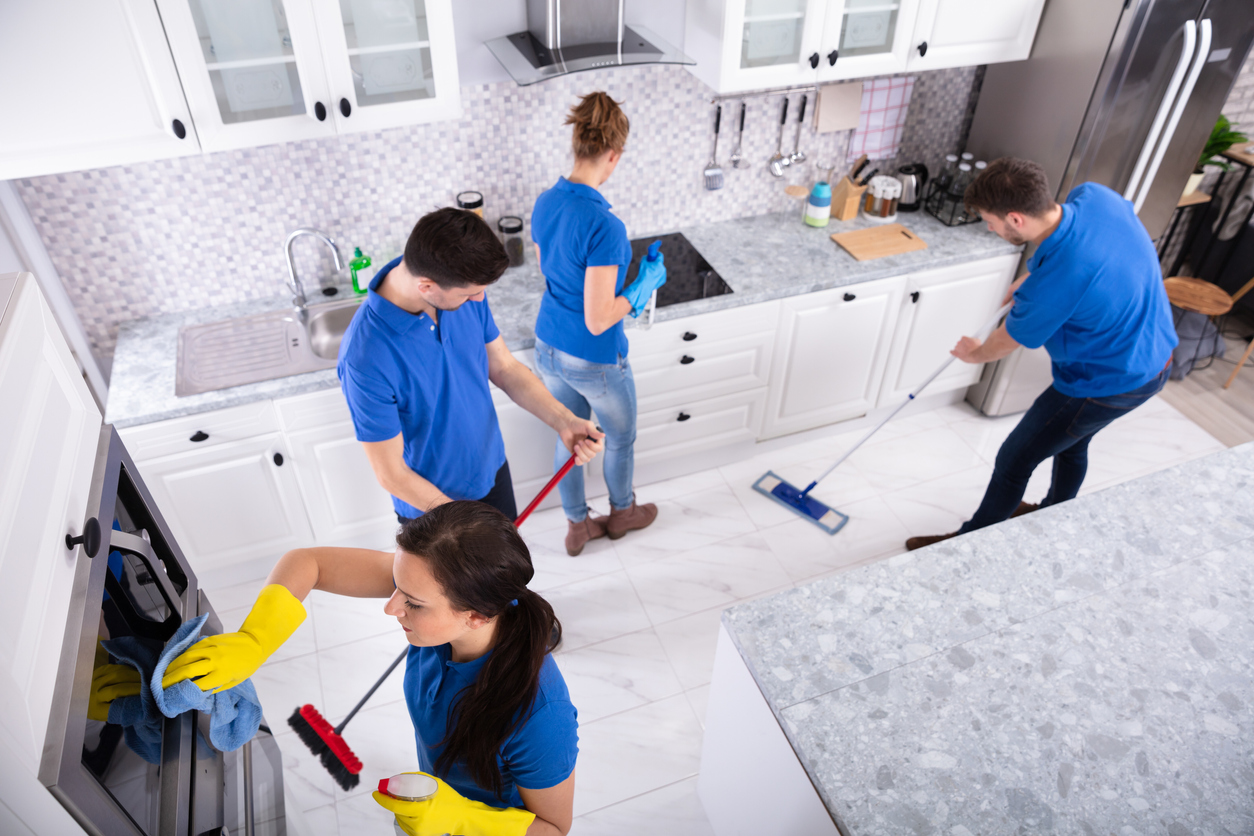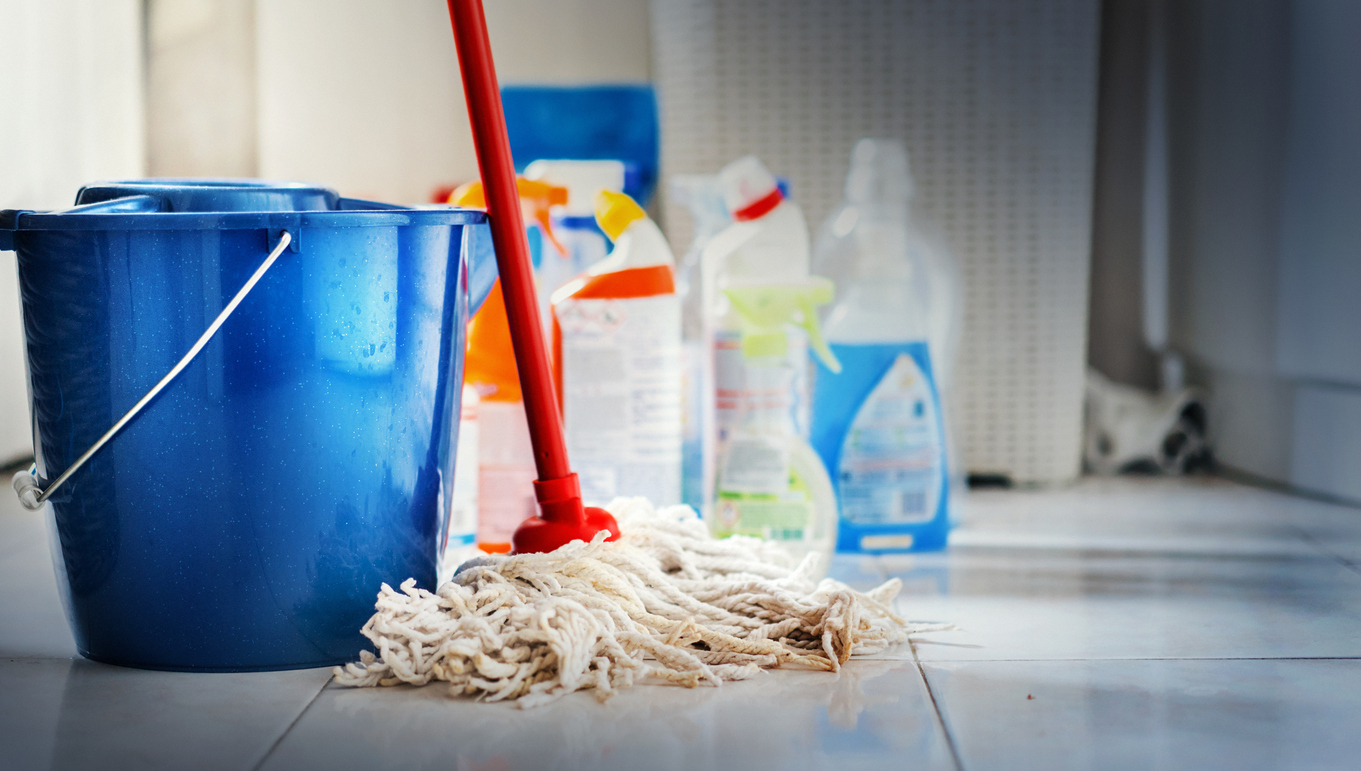
As with many businesses, starting a cleaning business may require a business owner to register with a state or local government and obtain specific business licenses.

Updated on Nov 29, 2023 7:56 PM EST

We may earn revenue from the products available on this page and participate in affiliate programs. Learn More ›
A: Starting a cleaning business can be a profitable endeavor for aspiring entrepreneurs. In a world where cleanliness and hygiene are top of mind for many people, there’s an opportunity to make good money and build strong customer relationships.
Before diving in, a new business owner will want to know about the licenses and permits for a cleaning business. Obtaining the necessary licenses is an essential component of how to start a cleaning business, as it keeps the business owner legally compliant and shows customers they’re serious about doing a good job. Even the best cleaning services need to have the proper licenses to operate.
There are several things a prospective business owner will need to know about which licenses may be required for starting a cleaning business, including how to apply for a cleaning license and how to ensure legal compliance in their particular jurisdiction.
A few different options are available for structuring a business, including a sole proprietorship, a partnership, a limited liability company (LLC), or an S or C corporation. An LLC license for a cleaning business offers the advantage of protecting personal assets from potential business liabilities, making it a popular option for many entrepreneurs. Owners who go the sole proprietorship route and wish to operate under any cleaning-business names aside from their individual legal name will need to obtain a “doing business as” (DBA) (also known as a “fictitious business name”) license.
“A business license may be needed in your state,” explains Sharon Tinberg, residential home cleaning process and procedure expert for the International Sanitary Supply Association (ISSA). “If it is, the first thing you must do is choose a name for your business or license the business under your own personal name. Any company name will be needed on the business license.”
Once this foundational decision is made, it sets the stage for the next steps, which include applying for the necessary business licenses and permits. Making the right choice at this juncture is crucial, as it impacts both the legal and operational aspects of the enterprise. Once a license is obtained, the license number can then be incorporated into marketing materials such as a website, flyers, and cleaning-business cards so customers know the business is a legitimate registered operation.
Although a business owner can take on the process of registering their business and acquiring the correct permits themselves, some may choose to work with a business registration service to make sure they check all the necessary boxes. This type of service comes at a cost, but it can be worth it for business owners to know that they have followed the proper procedures to legally operate a business.
Licensing requirements in one city might differ from those of a neighboring city or county. Those looking to start a cleaning business will want to consult with their Secretary of State’s office, which often provides overarching state requirements. Additionally, local municipal offices can offer insights into city- or county-specific licensing criteria.
That said, there are some common requirements that will likely apply no matter where a business is located. A basic business license, sometimes known as a business tax certificate, is required for any company to legally operate within a city or county.
For those who specialize in certain areas—like a dry cleaning business, carpet cleaning business, or window cleaning business—a specialized permit might be necessary due to the specific equipment or chemicals used. If the cleaning business disposes of cleaning solutions or other chemicals, an environmental or waste disposal permit might be mandated for eco-friendly practices.
In certain areas, if a vehicle is used in connection with providing commercial business-cleaning services, local permits or decals also might be needed. Some municipalities might require health permits, especially if the cleaning service works in environments such as restaurants or medical facilities.

The cost associated with obtaining a business license for a cleaning business can vary significantly depending on the jurisdiction in which the business operates. These costs are typically determined by local and state government authorities, and they may include various fees and charges for the necessary permits and licenses.
The range of costs can be quite broad, with some jurisdictions charging nominal fees, often starting around $100 for a basic business license. However, in larger cities or regions with more stringent regulations, the cost may be higher, potentially reaching $500 or more.
It’s essential for aspiring cleaning-business owners to research the specific requirements and fees in their local area to budget accordingly. While the cleaning-business license cost is an important consideration, it’s a necessary step to ensure legal compliance and establish a legitimate cleaning enterprise within the chosen jurisdiction.

For those cleaning businesses that intend to onboard employees, obtaining an Employer Identification Number (EIN) is essential. The EIN serves as a unique identifier for a business and is crucial for tax reporting and other federal responsibilities. It’s essentially a Social Security number but for a business. With an EIN, businesses can handle employee payroll, open business bank accounts, and meet Internal Revenue Service (IRS) reporting requirements.
Applying for an EIN from the IRS is a straightforward process. To begin, entrepreneurs can visit the official IRS website and navigate to the EIN application section. Here, they can fill out the online EIN application form and provide details about their business, including its structure, ownership, and purpose.
Once the form is completed and submitted, the IRS typically issues the EIN instantly or within a short time frame. This number will serve as the business’s federal tax identification, and it’s essential for various business operations, including hiring employees, opening bank accounts, and filing tax returns.
A surety bond, particularly a janitorial bond, acts as a safeguard for cleaning businesses, offering a layer of financial protection for business owners. A janitorial bond is essentially a contract between the business, the client, and the bond provider that guarantees to the client that they will be reimbursed for any property theft—both alleged and actual—that occurs during a cleaning job.
For example, if a client finds that a valuable piece of jewelry is missing after an employee of the cleaning business was at their home, they may assume that the employee stole it. A janitorial bond can reimburse the client for the value of the item. It may seem like a strange decision to reimburse a client for theft if the employee swears they didn’t take the item, but reimbursing a client for alleged theft can help prevent more expensive legal battles down the road, so many business owners choose to obtain a surety bond for this reason.
Not only does this bond provide peace of mind to the business owner, but it also builds trust with clients, assuring them that the business is committed to hiring trustworthy cleaners who will respect the client’s property.

In certain municipalities, there are strict guidelines pertaining to the disposal of cleaning products or other chemicals to ensure environmental safety and public health. Local regulations might require a business owner to obtain a specific permit to handle and dispose of these chemicals correctly.
Acquiring the appropriate permit not only ensures that the business operates within legal parameters but also underscores its commitment to responsible and environmentally conscious practices. Cleaning businesses will need to be aware of and adhere to these local regulations to avoid potential legal complications and promote sustainable operations.
Insurance coverage is an indispensable aspect of operating a cleaning business. Beyond the necessary licenses and permits, ensuring the business against potential risks and liabilities is paramount for a business owner. Whether it’s protection against property damage, potential employee injuries, or legal claims from clients, having the right cleaning-business insurance policies in place provides both financial security and peace of mind. Working the cost of cleaning-business insurance into the budget can help the business owner avoid unexpected costs.
Different types of insurance coverages, such as general liability, workers’ compensation, and commercial auto insurance, cater to various facets of business operations. General liability insurance, for instance, is designed to protect the business against claims of bodily injury or property damage that might occur during operations. This ensures that if a client’s property is accidentally damaged, or if the client sustains an injury due to the actions of the cleaning business, the business won’t bear the brunt of the financial fallout. Workers’ compensation insurance is crucial for businesses that hire employees, as it provides coverage for injuries or illnesses they might sustain while on the job. It ensures that workers receive necessary medical care and compensation for any resulting lost wages.
Additionally, commercial auto insurance is mandatory for cleaning businesses that use vehicles for transportation and service delivery. This type of policy protects a business owner against liability arising from accidents, such as property damage or injuries to third parties, and provides coverage for the vehicles themselves.
The best small-business insurance companies, such as Thimble Insurance or Progressive Commercial, offer these types of coverages, as well as others that may apply to a cleaning business.
While the licenses listed above are typically necessary for a cleaning business to operate legally, certifications are not obligatory. However, having one can significantly enhance a business’s reputation and trustworthiness.
“There are numerous certification programs available and I would recommend taking a couple of them to ensure you know all you need to know about products, tools, processes and procedures,” recommends Tinberg. “ISSA is a good resource for education regarding the cleaning industry.”
Commercial cleaning certifications, such as those offered by industry organizations or training programs, demonstrate a business’s commitment to professionalism and a high standard of service. These certifications can cover various aspects, from eco-friendly cleaning practices to specialized services such as carpet cleaning or disinfection. Obtaining certifications can set a cleaning business apart from competitors and instill confidence in potential clients. Ultimately, the decision to pursue certifications needs to align with the business’s goals and the preferences of its target audience.

Licensing and certification costs are a necessary up-front expense in establishing a legally compliant business within the cleaning industry. By incorporating these costs into their house-cleaning prices, owners can ensure that they not only cover the initial expenses but also maintain profitability over time.
Clients often perceive certified and licensed cleaning businesses as more trustworthy and capable, which can help the business justify slightly higher rates, especially deep-cleaning costs and similar services. However, it’s essential to strike a balance between competitive pricing and the added value that certifications and licenses bring to the business, ultimately benefiting both the company and its customers.
Proper licensing and compliance are crucial for cleaning businesses, from the foundational decisions of choosing a business structure such as an LLC or a DBA to the intricacies of local and specialized licenses. Business owners can show their commitment to professionalism and responsibility by ensuring that the business is protected with the right insurance and adhering to specific waste disposal regulations, especially concerning chemicals.
As with any venture, due diligence in understanding and meeting all requirements prevents potential legal hiccups and also sets the business on a path of credibility and success.

Nicole Fallon-Peek writes for BobVila.com on home improvement topics, calling on the experience she gained working over many summers and weekends for her father’s general contracting firm—experience that also equipped her to carry out a full home renovation during the pandemic. When not immersed in home DIY projects, she and her husband are busy running their own content marketing agency and experimenting with fancy ingredients in their newly upgraded kitchen.
Learn more about BobVila.com Editorial Standards